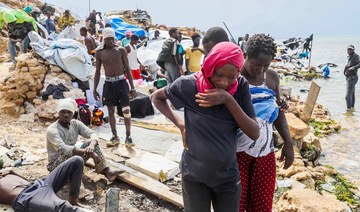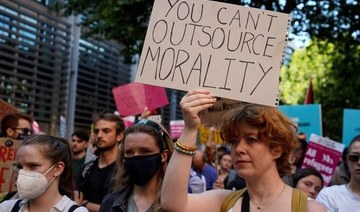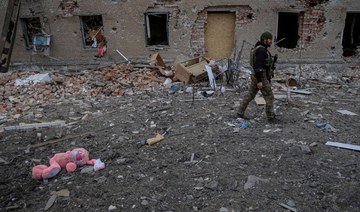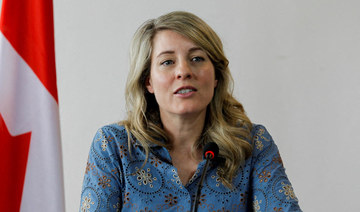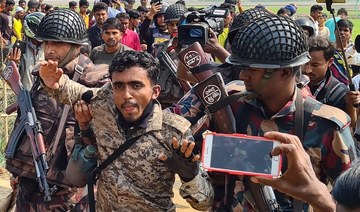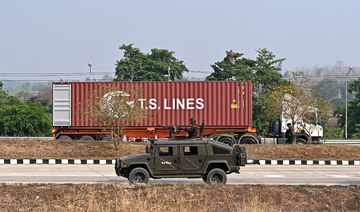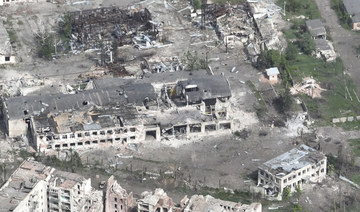SAINT-LOUIS, Senegal: The small mounds of sand that dot the beach in northern Senegal blend into the terrain. But thick rope juts out from beneath the piles. Pieces of black plastic bags are scattered nearby, and green netting is strewn on top.
That’s how residents in the small fishing town of Saint-Louis say they know where the bodies lie.
These unmarked beach graves hold untold numbers of West African migrants who are increasingly attempting the treacherous journey across parts of the Atlantic to Europe, Senegalese authorities, residents along the coast and survivors of failed boat trips told The Associated Press.
Bodies wash ashore or are found by fishermen at sea, then are buried by authorities with no clarity as to whether the deaths are documented or investigated as required by Senegalese and international law, according to lawyers and human rights experts. Most of the families of those buried will never know what happened to their loved ones.
The route from West Africa to Spain is one of the world’s most dangerous, yet the number of migrants leaving from Senegal on rickety wooden boats has surged over the past year. That means more missing people and deaths — relatives, activists and officials have reported hundreds over the past month, though exact figures are difficult to verify.
The increases come amid European Union pressure for North and West African countries to stop migrant crossings. Like most nations in the region, Senegal releases little information about the crossings, the migrants who attempt the trip or those who die trying.
But according to the International Organization for Migration, at least 2,300 migrants left Senegal trying to reach Spain’s Canary Islands in the first six months of the year, doubling the number from the same period in 2022. A Spanish official, speaking on condition of anonymity because the figures weren’t authorized for release, told AP that about 1,100 arrived in the Canaries.
It’s unclear what happened to the 1,000-plus people who didn’t make it to Spain. They may have died at sea, been rescued from capsized boats or be held by authorities. Through June, Senegal detained 725 migrants, said interior ministry spokesman Maham Ka, though officials wouldn’t say whether the nine vessels involved had left shore yet.
Authorities in Saint-Louis admitted to AP that bodies are sometimes buried on the beach. They said it happens only when approved by the local prosecutor — and usually the bodies are severely decomposed.
“Why take it to the morgue since no one can recognize it?” said Amadou Fall, fire brigade commander for three northern Senegal regions.
The prosecutor in Saint-Louis wouldn’t respond to questions about approval of burials or say whether investigations were opened into the deaths. AP phoned and texted Senegal’s justice ministry, responsible for investigating deaths, but received no response.
For families, the silence can be agonizing. Mouhamed Niang’s 19- and 24-year-old nephews went missing a month ago. He filed missing-person reports, he said, but got no updates from authorities. Friends alerted him when boats were recovered or bodies washed ashore. He’d make the three-hour bus trip from Mbour north to Saint-Louis to check with officials or visit the morgue.
He told AP he knows about the bodies on the beach. His worst fear: that the young men were among them.
“They are human beings,” Niang, 51, said. “They should be buried where human beings are buried.”
If the journey goes smoothly, reaching Spain takes about eight days from Saint-Louis on pirogues — long, colorful wooden boats. Saint-Louis, bordering Mauritania, is a key hub for departures. There, the beach is now marked in parts with remnants of the black plastic resembling body bags from the morgue and the knotted rope that appears to secure what lies beneath the sand.
In recent years, the Canary Islands have again become a main gateway for those trying to reach Europe. Previously, most boats traveled from Morocco, Western Sahara and Mauritania, with fewer from Senegal. This year, that changed. The Spanish official who spoke to AP said numbers from Mauritania plummeted last year following pressure by local authorities with on-the-ground Spanish support. When one route is cut off, migrants tend to look for alternatives, even if they’re longer and more dangerous.
Senegal has long been regarded as a beacon of democratic stability in a region riddled with coups and insecurity, but tension is mounting, with at least 23 killed last month during protests between opposition supporters and police. Some cite political strife for surging migration; others note that most who leave are young Senegalese men who say poverty and a lack of jobs drive them.
“There’s no freedom in Senegal,” said Papa, 29, who made it to the Canaries this month after a boat journey during which the engine failed, food ran out and fights erupted.
He said he’s seeking asylum in Spain because of Senegal’s political problems. He described police shooting at people like him who took to the streets to oppose President Macky Sall. He and others among the hundreds of Senegalese who made it to the Canaries in recent weeks blamed unemployment, a struggling economy and rising food prices on Sall’s administration.
“The salaries are not good, rice is too expensive. You need a lot of money to eat,” said Papa, who has two wives and children to feed in Senegal. Wearing a bracelet with the name of opposition leader Ousmane Sonko, Papa gave only his first name, citing fears about deportation.
Since 2006, Spain has worked with Senegal to crack down on migrant boats. That year, Canaries arrivals first peaked, with 30,000-plus people — many of them Senegalese. Today, Spain’s national police and civil guard are deployed in Senegal to assist local authorities. Senegal also received more than $190 million from the EU’s Emergency Trust Fund for Africa for programs aimed at addressing the root causes of migration.
But residents here say little has improved.
From May to July, about 30 boats left Saint-Louis for Europe and about 10 sank, said El Hadji Dousse Fall, of the Organization for the Fight Against Clandestine Immigration, which tries to prevent youths from crossing the sea and teaches them about legal migration pathways. Still, many have already made up their minds.
“They have a saying,” Fall said, speaking partly in the local Wolof language. “Barca or Barsakh” — Barcelona or die.
Senegalese officials won’t give data on how many people are unaccounted for trying to cross that stretch of the Atlantic. Sometimes, they refute reports of missing people — this month, Spanish rights group Walking Borders rang the alarm that 300 Senegalese were missing, and the government called the statements unfounded.
The beach burials have happened for years but skyrocketed for 2023, with about 300 bodies in the first seven months, compared with just over 100 for all of 2022, according to a local official who works closely with authorities and insisted on anonymity for fear of reprisal.
Locals say the government tries to hide the scale of the problem because it tarnishes Senegal’s reputation.
“It’s a sign of failure that undermines the government’s public policy record,” said Alioune Tine, founder of West African think tank Afrikajom Center.
During a visit to Saint-Louis, AP spoke with two survivors of attempted trips. The men departed within days of each other, from Mbour in early July. Both boats got lost and capsized at the mouth of the Saint-Louis river, where waves swell and conditions can turn volatile. One survivor saw another boat capsize minutes after his.
The men said that of about 420 people aboard the three vessels, roughly 60 were rescued.
Ibnou Diagne, 35, said the boat capsized days into the trip. He watched a piece of broken boat wood ram into the stomach of a teenage passenger, stabbing him before he fell into the sea.
But what haunts him most are memories of his longtime friend Abdourahmane, who drowned. “Everyday when I sleep, it’s Abdourahmane’s image and face that emerge in front of me,” he said.
The other survivor said he fled after the rescue — he was taken for questioning but got out of the car and hid. On condition of anonymity for fear of being detained again, he described waking at 4 a.m. to his boat being launched in the air upon hitting a giant wave.
Thrown into the water but able to swim, he anchored himself to a smaller nearby vessel and waited for rescue. Two friends who boarded with him drowned. Days later, he called their mothers to tell them their sons were dead. Without him, he said, the families would have no idea what happened to the men.
Senegal has agreed to several international accords, including The African Charter on Human and Peoples’ Rights and The Global Compact on Migration, to ensure the investigation of disappearances and arbitrary deaths, identify the dead, and inform families.
Even if a body has decomposed, the obligation remains to do everything possible to identify the person and seek support if resources are lacking, said Judith Sunderland, of Human Rights Watch.
“It’s completely unacceptable for state authorities to bury people without investigating the causes of their deaths or attempting to identify them,” she said.
Boubacar Tiane Balde, chief of the anti-smuggling regional branch in Saint-Louis, said stemming the tide of migration is challenging, with new cases daily. And smugglers, paid by migrants to get across the border, are embedded in the community.
“The biggest difficulty is first to have clear information,” Balde said. “Not everyone is willing to collaborate.”
Some say officials aren’t serious about cracking down. Many boats bribe authorities on the water, sometimes paying $1,700 to get through, said a smuggler who insisted on anonymity over fears for his safety. To stay undetected, he uses smaller boats to shuttle passengers so it appears they’re just fishing, he said, and for safety, he’s cut the number of passengers allowed to 80 from 140.
Such measures come as little comfort to those with missing relatives.
During Niang’s fourth visit to Saint-Louis to look for his nephews, he was called to the morgue. But the men weren’t there. Later, authorities reached out to their mother, Niang’s sister. They wanted her and her husband to make a photo identification. Based on a ring and his long hair, they knew the body was their son.
They still don’t know the fate of his brother. They aren’t alone in their grief, but that brings little solace.
“Every day I see people looking for relatives lost at sea,” Niang said. “Some of them conduct funerals without the bodies.”
The family will travel to Saint-Louis, then bring the body home. They’ll hold one funeral, with prayers for both brothers.
As more migrants go missing at sea, many say bodies end up on Senegal’s beaches in unmarked graves
https://arab.news/zj9j4
As more migrants go missing at sea, many say bodies end up on Senegal’s beaches in unmarked graves

Send us Patriots: Ukraine’s battered energy plants seek air defenses against Russian attacks

- Ukraine's foreign minister has said half of the country’s energy system has been damaged by Russian attacks
- Russian President Vladimir Putin has framed the attacks as retaliation for Ukrainian strikes on Russian oil refineries
KYIV, Ukraine: At a Ukrainian power plant repeatedly hit by Russian aerial attacks, equipment department chief Oleh has a one-word answer when asked what Ukraine’s battered energy industry needs most: “Patriot.”
Ukrainian energy workers are struggling to repair the damage from intensifying airstrikes aimed at pulverizing Ukraine’s energy grid, hobbling the economy and sapping the public’s morale. Staff worry they will lose the race to prepare for winter unless allies come up with air-defense systems like the US-made Patriots to stop Russian attacks inflicting more destruction on already damaged plants.
“Rockets hit fast. Fixing takes long,” Oleh said in limited but forceful English.
The US has sent Ukraine some Patriot missile systems, and said last week it would give more after entreaties from President Volodymyr Zelensky.
The Associated Press on Thursday visited a plant owned by DTEK, the country’s biggest private energy supplier, days after a cruise-missile attack left parts of it a mess of smashed glass, shattered bricks and twisted metal. The coal-fired plant is one of four DTEK power stations struck on the same day last week.
The AP was given access on the condition that the location of the facility, technical details of the damage and workers’ full names are not published due to security concerns.
During the visit, State Emergency Service workers in hard hats and harnesses clambered atop the twisted roof of a vast building, assessing the damage and occasionally dislodging chunks of debris with a thunderous clang.
Ukrainian Foreign Minister Dmytro Kuleba told Foreign Policy magazine that half of the country’s energy system has been damaged by Russian attacks.
DTEK says it has lost 80 percent of its electricity-generating capacity in almost 180 aerial attacks since the start of Russia’s full-scale invasion in 2022. It estimates that repairing all the damaged plants would take between six months and two years — even if there are no more strikes.
Shift supervisor Ruslan was on duty in the operations room when the air alarm sounded. He sent his crew to a basement shelter but remained at his post when the blast struck only meters (yards) away.
He rushed out to darkness, dust and fire. He said he wasn’t scared because “I knew what I needed to do” – make sure his team was OK and then try to help put out the flames.
Russia pummeled Ukraine’s energy infrastructure to devastating effect during the “blackout winter” of 2022-23. In March it launched a new wave of attacks, one of which completely destroyed the Trypilska power plant near Kyiv, one of the country’s biggest.
Russian President Vladimir Putin has framed the attacks as retaliation for Ukrainian strikes on Russian oil refineries.
Oleh said the Russians are “learning all the time” and adapting their tactics. Initially they targeted transformers that distribute power; now they aim for the power-generating equipment itself, with increasing accuracy. The Russians also are sending growing numbers of missiles and exploding drones to exhaust Ukraine’s air defenses, and striking the same targets repeatedly.
DTEK executive director Dmytro Sakharuk said in March that out of 10 units the company had repaired after earlier strikes, two-thirds had been hit again.
More Russian missiles have been getting through in recent months as Ukraine awaited new supplies from allies, including a $61 billion package from the US that was held up for months by wrangling in Congress. It was finally approved in April, but it could be weeks or months before all the new weapons and ammunition arrives.
Ukraine’s energy firms have all but exhausted their finances, equipment and spare parts fixing the damage Russia has already wrought. The country’s power plants urgently need specialist equipment that Ukraine can no longer make at sufficient speed and scale.
Some 51 DTEK employees have been wounded in attacks since 2022, and three have been killed. Staff say they keep working despite the danger because they know how crucial their work is.
Machine operator Dmytro, who was on shift during the recent attack and took shelter in the basement, said that when he emerged, “my soul was bleeding when I saw the scale of the destruction.”
He thought of the many people who had poured heart and soul into building the mammoth power plant.
“This was destroyed in a few seconds, in an instant,” he said.
Dmytro, who worked at Ukraine’s Zaporizhzhia nuclear power plant before it was seized by Russia, said he would continue to show up for work every day, “as long as I’m able.”
“It’s our duty toward the country,” he said
Biden says ‘order must prevail’ during campus protests over the war in Gaza

- “Dissent is essential for democracy. But dissent must never lead to disorder,” the president said at the White House
- The Democratic president broke days of silence on the protests with his remarks amid mounting criticism from Republicans
WASHINGTON: President Joe Biden on Thursday rejected calls from student protesters to change his approach to the war in Gaza while insisting that “order must prevail” as college campuses across the country face a wave of violence, outrage and fear.
“Dissent is essential for democracy,” Biden said at the White House. “But dissent must never lead to disorder.”
The Democratic president broke days of silence on the protests with his remarks, which followed mounting criticism from Republicans who have tried to turn scenes of unrest into a campaign cudgel. By focusing on a law-and-order message while defending the right to free speech, Biden is grasping for a middle ground on an intensely divisive issue in the middle of his reelection campaign.
He largely sidestepped protesters’ demands, which have included ending US support for Israeli military operations. Asked after his remarks whether the demonstrations would prompt him to consider changing course, Biden responded with a simple “no.”
Biden said that he did not want the National Guard to be deployed to campuses. Some Republicans have called for sending in troops, an idea with a fraught history. Four students were shot and killed at Kent State University by members of the Ohio National Guard during protests over the Vietnam War in 1970.
Tensions on college campuses have been building for days as demonstrators refuse to remove encampments and administrators turn to police to clear them by force, leading to clashes that have seized widespread attention.
Biden said he rejected efforts to use the situation to “score political points,” calling the situation a “moment for clarity.”
“There’s the right to protest, but not the right to cause chaos,” Biden said shortly before leaving the White House for a trip to North Carolina. “People have the right to get an education, the right to get a degree, the right to walk across campus safely without fear of being attacked.”
The White House also maintained its focus on combating antisemitism. Doug Emhoff, husband of Vice President Kamala Harris, spoke to Jewish students and Hillel leaders on Thursday to hear about their experience with threats and hate speech, according to a White House official.
Biden will make his own visit to a college campus on May 19 when he’s scheduled to deliver the commencement address at Morehouse University in Atlanta.
His last previous public comment on the demonstrations came more than a week ago, when he condemned “antisemitic protests” and “those who don’t understand what’s going on with the Palestinians.”
The White House, which has been peppered with questions by reporters, had gone only slightly further than the president. On Wednesday, press secretary Karine Jean-Pierre said that Biden was “monitoring the situation closely” and that some demonstrations had stepped over a line that separated free speech from unlawful behavior.
“Forcibly taking over a building,” such as what happened at Columbia University in New York, “is not peaceful,” she said. “It’s just not.”
Biden’s latest remarks weren’t well received in some corners of the Democratic Party.
“We need to prevent lawlessness in society. We need to have protections against hate speech,” said a social media post from Patrick Gaspard, president of the Center for American Progress and a former White House political director under President Barack Obama. “But we need to be able to hold space for active dissent and activism that is discomforting without blanket accusations of hate and violence against all activists.”
But Biden’s team has expressed confidence that his stance appeals to the widest array of voters. It also echoes his approach to nationwide unrest after the murder of George Floyd by a police officer four years ago, a politically volatile situation in the middle of his campaign against then-President Donald Trump.
“I want to make it absolutely clear rioting is not protesting, looting is not protesting,” Biden said then in remarks that his team turned into an advertisement. “It’s lawlessness, plain and simple, and those that do it should be prosecuted.”
Biden has never been much for protests of any kind. His career in elected office began as a county official when he was only 28 years old, and he’s always espoused the political importance of compromise.
As college campuses convulsed with anger over the Vietnam War in 1968, Biden was in law school at Syracuse University.
“I’m not big on flak jackets and tie-dyed shirts,” he said years later. “You know, that’s not me.″
The White House has also maintained its focus on combating antisemitism. Doug Emhoff, husband of Vice President Kamala Harris, spoke to Jewish students and Hillel leaders on Thursday to hear about their experience with threats and hate speech, according to a White House official.
Despite the administration’s criticism of violent college protests and Biden’s refusal to heed demands to cut off US support for Israel, Republicans blame Democrats for the disorder and have used it as a backdrop for press conferences.
“We need the president of the United States to speak to the issue and say this is wrong,” House Speaker Mike Johnson, a Louisiana Republican, said on Tuesday. “What’s happening on college campuses right now is wrong.”
Johnson visited Columbia University with other members of his caucus last week. House Republicans sparred verbally with protesters while speaking to the media at George Washington University in Washington, D.C., on Wednesday.
Trump, who is running for another term as president, also criticized Biden in an interview with Sean Hannity on Fox News.
“Biden has to do something,” he said. “Biden is supposed to be the voice of our country, and it’s certainly not much of a voice. It’s a voice that nobody’s heard.”
He repeated his criticisms on Wednesday during a campaign event in Waukesha, Wisconsin.
“The radical extremists and far-left agitators are terrorizing college campuses, as you possibly noticed,” Trump said. “And Biden’s nowhere to be found. He hasn’t said anything.”
Kate Berner, who served as deputy communications director for Biden’s campaign in 2020, said Republicans already had tried the same tactic during protests over Floyd’s murder.
“People rejected that,” she said. “They saw that it was just fearmongering. They saw that it wasn’t based in reality.”
Apart from condemning antisemitism, the White House has been reluctant to directly engage on the issue.
Jean-Pierre repeatedly deflected questions during a briefing on Monday.
Asked whether protesters should be disciplined by their schools, she said “universities and colleges make their own decisions” and “we’re not going to weigh in from here.”
Pressed on whether police should be called in, she said “that’s up to the colleges and universities.”
Asked on Thursday why Biden chose to speak on the matter after police had arrested protesters at the University of California, Los Angeles and at universities in New York City, Jean-Pierre stressed instead the importance of any protests being nonviolent.
“We’ve been very consistent here,” she said. “Americans have the right to peacefully protest as long as it’s within the law and violence is not protected.”
Students erect pro-Palestinian encampments across major Canadian universities

- “If public disruption is the only way to get our voice heard, then we are willing to do that,” says University of Toronto protest leader
- Some Jewish groups have accused protesters of being antisemitic, but organizers said some protesters are Jewish
TORONTO: Quebec Premier Francois Legault said on Thursday the encampment at Montreal’s McGill University should be dismantled as more students erected pro-Palestinian camps across some of Canada’s largest universities, demanding they divest from groups with ties to Israel.
The Canadian protests come as police have been arresting hundreds on US campuses and the death toll in Gaza has been mounting.
While McGill had requested police intervention, law enforcement had not stepped in Thursday to clear the encampment and said in a statement Thursday evening it was monitoring the situation.
Students also set up encampments at Canadian schools including the University of Toronto, the University of British Columbia and the University of Ottawa.
“We want the camp to be dismantled. We trust the police, let them do their job,” a spokesperson for Legault said.
There was also a pro-Israel counter-protest in Montreal Thursday. The two sides were kept separate.
On Thursday morning, students at the University of Toronto set up an encampment in a fenced-off grassy space at the school’s downtown campus where some 100 protesters gathered with dozens of tents.
According to a statement from organizers the encampment will stay until the university discloses its investments, divests from any that “sustain Israeli apartheid, occupation and illegal settlement of Palestine” and ends partnerships with some Israeli academic institutions.
Israel says it does not participate in apartheid and that its assault on Gaza does not constitute genocide.
A university spokesperson told Reuters it was “in dialogue with the protesters” and that, as of midday, the encampment was “not disruptive to normal university activities.”
University of Toronto graduate student and encampment spokesperson Sara Rasikh told Reuters they will remain until their demands are met.
“If public disruption is the only way to get our voice heard, then we are willing to do that,” she said.
Some Jewish groups have accused protesters of being antisemitic. Organizers deny that charge, noting that some protesters are Jewish.
Asked to comment on the encampments, Prime Minister Justin Trudeau’s office pointed to a statement he made on Tuesday, saying “Universities are places of learning, they’re places for freedom of expression ... but that only works if people feel safe on campus. Right now ... Jewish students do not feel safe. That’s not right.”
The protests follow the deadly Oct. 7 attack on southern Israel by Hamas militants from the Gaza Strip, which killed 1,200 people and saw dozens taken hostage, and an ensuing Israeli offensive that has killed about 34,000 and created a humanitarian crisis.
India deports Myanmar refugees who fled 2021 coup

- At least 38 refugees were deported on Thursday by the border state of Manipur
- ndia is not a signatory to the1951 UN Refugee Convention and has no law protecting refugees
GUWAHATI, India: India on Thursday deported the first group of Myanmar refugees who had sought shelter after a 2021 military coup, a top state minister said, following weeks of efforts that were hampered by fighting between Myanmar’s rebel forces and the ruling junta.
Thousands of civilians and hundreds of troops from Myanmar have crossed the border to India after the coup. This has worried New Delhi, which has announced plans to fence its border with Myanmar and end a visa-free movement policy.
At least 38 refugees were deported on Thursday by the border state of Manipur, which plans send back a total of 77 people as it copes with sporadic violence that has killed at least 220 people since ethnic clashes broke out in May last year.
“Without any discrimination, we have completed the first phase of deportation of illegal immigrants from Myanmar,” Manipur Chief Minister N. Biren Singh said in a social media post. “The state government is continuing the identification of illegal immigrants.”
One Indian national was also repatriated by Myanmar, Singh added.
New Delhi has not signed the 1951 UN Refugee Convention, which spells out refugee rights and states’ responsibilities to protect them, and it does not have its own laws protecting refugees.
Singh, who is from Prime Minister Narendra Modi’s Bharatiya Janata Party, said in March deportations had begun, but Indian security officials said the efforts were held up by fighting in Myanmar.
Modi is seeking a rare third straight term in ongoing national elections and his government has blamed the refugee influx as one reason for violence that has roiled Manipur.
Britain’s foreign secretary, in Kyiv, promises Ukraine aid for ‘as long as it takes’

- Cameron said Ukraine had a right to use the weapons provided by London to strike targets inside Russia
- 8 children injured in Russian strikes in Kharkiv region amid Cameron's visit
KYIV: British Foreign Secretary David Cameron promised three billion pounds ($3.74 billion) of annual military aid for Ukraine for “as long as it takes” on Thursday, adding that London had no objection to the weapons being used inside Russia.
“We will give three billion pounds every year for as long as is necessary. We’ve just really emptied all we can in terms of giving equipment,” he told Reuters in an interview on a visit to in Kyiv, adding that the aid package was the largest from the UK so far.
“Some of that (equipment) is actually arriving in Ukraine today, while I’m here,” he said.
Cameron said Ukraine had a right to use the weapons provided by London to strike targets inside Russia, and that it was up to Kyiv whether to do so.
“Ukraine has that right. Just as Russia is striking inside Ukraine, you can quite understand why Ukraine feels the need to make sure it’s defending itself,” Cameron told Reuters outside St. Michael’s Cathedral.
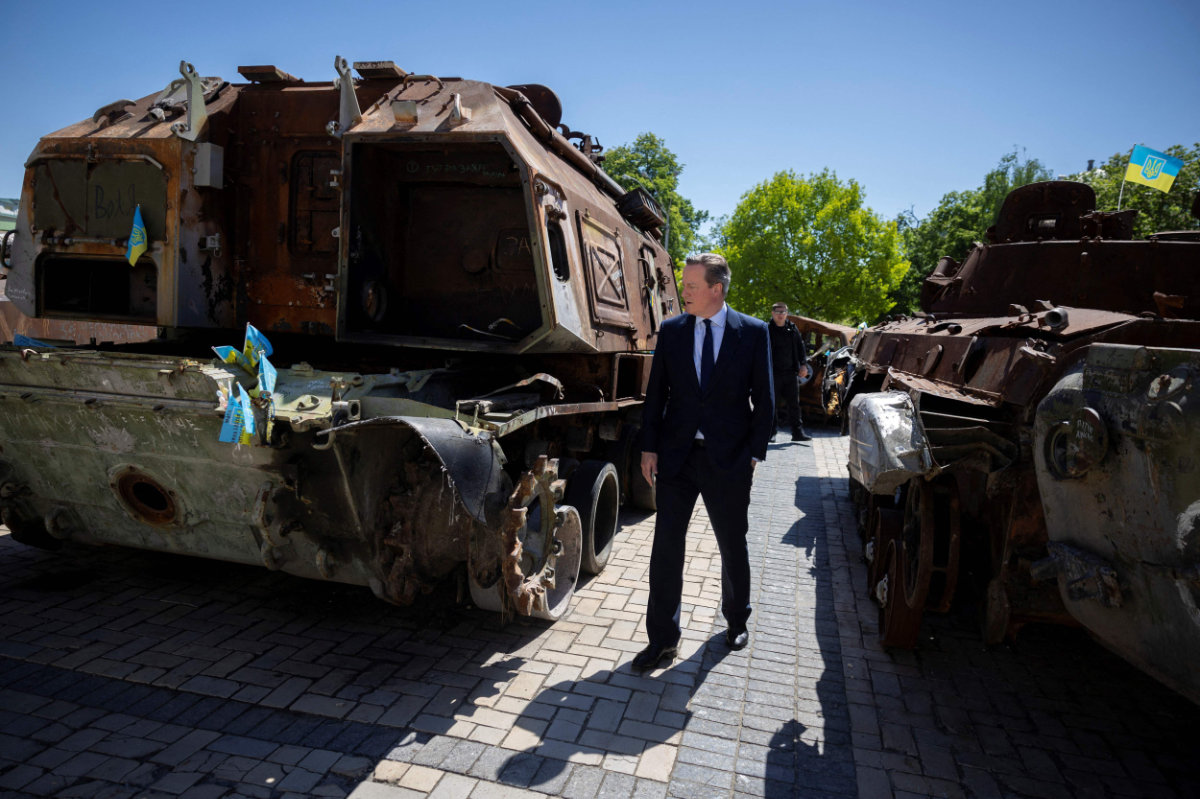
Cameron, who led the UK from 2010 and 2016 as prime minister and only returned to frontline politics several months ago, met Ukraine’s Foreign Minister Dmytro Kuleba and President Volodymyr Zelensky on his second visit to Kyiv as foreign secretary.
Britain’s top diplomat celebrated the release of a long-delayed $60 billion aid package by the US Congress.
“It’s absolutely crucial, not just in terms of the weapons it will bring, but also the boost to morale that it will bring to people here in Ukraine.”
Cameron did not answer directly when asked how he thought the possible re-election of Republican frontrunner Donald Trump to the White House could affect US support for Ukraine.
Trump and hard-line Republicans in Congress oppose further aid to Ukraine, with the possible exception of a loan.
“It’s not for us to decide who the Americans choose as their president — we will work with whoever that is,” Cameron said, adding that the strategy for Ukraine’s allies ought to be to ensure Ukraine is on the front foot by the time of the US elections in November.
Cameron met Ukraine’s FM Dmytro Kuleba and President Volodymyr Zelensky on his second visit to Kyiv as foreign secretary
Britain’s top diplomat celebrated the release of a long-delayed $60 billion aid package by the US Congress.
Russian strike injures 8 children
While Cameron was in Ukraine, Russian guided bombs struck a site close to a sports complex in Ukraine's northeastern Kharkiv region, injuring at least eight children, local officials said.
The town of Derhachi where the incident occurred is a frequent target of Russian aerial strikes. Police said the bombs had landed on premises near the sports centre, sparking fires.
"The air raid siren didn't sound, there was no siren at all," Yana Korobets, head of the sports complex, told Reuters Television.
"I was outside when... I heard a missile fly by. I understood it landed behind our sports complex. It blew out the windows, and because the children are barefoot in our class they suffered cuts in their legs and their hands."
Debris from shattered glass was strewn about the complex. Blood stains were spattered on a wall and on the floor. Outside, the ground was pocked with large craters.
Four of the children suffered moderate injuries and the others minor ones, regional governor Oleh Synehubov said on the Telegram messaging app. An elderly man was also wounded.
"The consequences could have been more tragic," Synehubov told national TV.
Derhachi is near the border with Russia. The Kharkiv region where it is located has long been targeted by Russian attacks but the strikes have become more intense in recent months, hitting civilian and energy infrastructure.
Moscow denies deliberately targeting civilians but thousands have been killed and injured in the war that began with the full-scale invasion of Moscow troops in February 2022.



